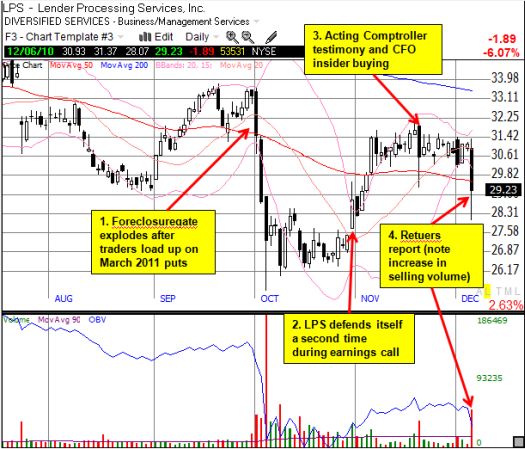Once again, negative news flow caught up with Lender Processing Services (LPS) – this time it was a Reuters report titled “Special report: Legal woes mount for a foreclosure kingpin” that provided additional sordid and scandalous details on now well-known allegations that have weighed on LPS for at least a year. Reuters essentially claims that there is much more to these allegations than the company has revealed to-date. Reuters rifled through public documents and filings, reviewed LPS intneral documents, and interviewed industry insiders. Reuters also obtained responses from LPS spokeswoman Michelle Kersch.
“…a Reuters investigation shows that LPS’s legal woes are more serious than [the CEO] let on. Public records reveal that the company’s LPS Default Solutions unit produced documents of dubious authenticity in far larger quantities than it has disclosed, and over a much longer timespan…Interviews with key players and court records also show that pending investigations and lawsuits pose a bigger threat to the company than [the CEO] let on.”
Some highlights of Reuters’s report and allegations:
- Questionable signing and notarization practices occurred in at least one other LPS office (Mendota Heights, Minnesota), not just the now closed subsidiary Docx. Fraudulent behavior included approving foreclosure documents with LPS employees representing themselves as officers of other financial institutions, including companies that had already ceased operating; signing assignments “…years after the mortgages should have been transferred to the investment trusts”; and “signing mortgage assignments after the foreclosures had been filed”.
- A lawsuit in Mississippi is a real threat given a similar case in Texas “…was dropped without any ruling on the merits of the allegations.”
- LPS’s working relationships with lawyers provided incentives to speed foreclosures through the legal process without proper due diligence. This process was driven by “LPS Desktop” which helps financial institutions automate the foreclosure process.
- LPS sometimes initiates foreclosure proceedings based on its access to the internal systems of financial institutions.
- Docx continued operating well past the date LPS claimed to have shut down the troubled subsidiary. Moreover, its questionable signing activities were not completely eliminated and instead moved to 3rd party partners.
Reuters concludes that “it remains unclear whether LPS faces more legal risks because of its document-signing operations or because of its odd arrangement with the lawyers assigned to file foreclosure actions.” If the long list of allegations proves even half true, LPS will certainly face large legal liabilities. The stakes here are huge given LPS serves 14 of the 15 biggest loan servicers in the U.S. Unfortunately for LPS, it has a business that is easy to hate given it helps speed up the foreclosure process, sending former homeowners out on the street faster than otherwise possible. The company will find little sympathy in the public arena.
For example, Reuters interviewed April Charney, “an attorney who represents homeowners at Jacksonville Area Legal Aid”. Charney had the following to say:
“…in most instances homeowners can’t afford lawyers and don’t challenge the foreclosures. In many states, judges often approve the foreclosures without carefully examining the documents… And at least until recently, when widespread questions were raised about the legitimacy of mortgage documents, judges routinely accepted belated mortgage assignments — even in cases contested by the homeowners.”
In my last piece on LPS, I noted that LPS CFO Thomas Schilling spent almost $150K buying company shares in the wake of testimony from the Acting Comptroller of the Currency, John Walsh. This testimony frightened investors when it specifically named LPS as the object of an investigation led by the Federal Reserve. The market responded to the CFO’s move by swiftly lifting the stock from the lows of the day. I wondered aloud at the time whether this action signaled the end of the woes for the stock…apparently not.
On Monday, LPS closed down 6% right at the lows while Walsh testified. The stock fell as much as 10%. Options players chose to target puts expiring at the end of next week. The large collection of puts at the 30 strike in March, 2011 that caught my attention two months ago saw little action. So, I am guessing that the folks who traded on the Reuters report expect reactionary selling momentum to continue unabated and do not necessarily expect the company’s prospects for fighting off these accumulating legal problems has materially changed.

*Chart created using TeleChart:

Be careful out there!
Full disclosure: long LPS put
